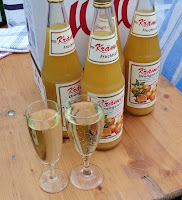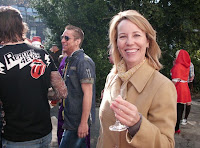On many levels the German people are a conservative group. When you meet someone new it's expected you will address and communicate with them formally until one or both of you suggest switching to the informal. Depending upon how you met the person, the nature of your relationship and how often you see each other this process can take weeks, months...even years. Upon walking into the grocery store or any other shop it's not likely you'll see someone with a name tag that says "Mary" or "Hannah" on it. Instead the name tag will say "Frau Wilke" (Mrs. Wilke) or something of that nature. And in keeping with the conservatism, topics of a personal, financial and religious nature are treaded upon even more lightly then is expected in the United States.
But when a holiday arrives....and in Germany there seems to be a holiday at least once or twice each month...there is no conservatism when it comes to celebration. While social conventions are big in this country, holidays are big too and the local folk approach them with a gusto and enthusiasm that lead you to feel you will be missing out if you don't, in some way, partake in the festivities.
So it was with this in mind that I met my dear fellow-American friend who's lived here for three years and headed into our small town square for the opening festivities of Karneval. Months before Karneval approached I had heard snippets of information about the event. All I knew was the holiday lasted five days, beginning on a Thursday and ending in the wee hours of the following Tuesday after a long Rosenmontag (Red Monday) celebration. Wedged in between the beginning and end were massive amounts of merriment, costumes, a parade, days off of work, eating, dancing and drinking. And, lest I forget to mention it, Karneval is a church holiday. In my mind, church or religious holidays always signified solemness, going to church and having a family dinner in the solitude of your own home. Not here. The Germans know how to celebrate and lighten up, emphasizing the point that when you work hard you must take time to play, too. Pubs and bars are open extended hours during regular and religious holidays and they are always full. During Karneval the pubs and nightclubs will open at 11am each morning and close the next morning at 7:00.
I'd asked many people, my boyfriend included, about Karneval and what it was. Their explanations helped me form an idea of Karneval but without a point of reference it just sounded like yet another reason to drink and be merry for what's referred to here as an extra-large weekend. Then I looked up Karneval on the internet and discovered it's actually the German version of Mardi Gras. A lightbulb went on over my head and it all made sense. All the pieces came together....costumes, eating large feasts and excessive sweets, dancing, drinking and crazy traditions leading up to a time of cutting back and making sacrifices. For all intents and purposes, Karneval is Germany's Mardi Gras...without the boobs and the beads.
My friend and I arrived in town early. On our way to the Rathause (mayor's buiilding) we walked through the Thursday morning outdoor market where one stand was offering free jello shots. Here, jello is referred to as "wackelpudding" which translates to "wobble pudding". Normally, you eat wackelpudding with vanilla sauce drizzled over the top but this time it was mixed with vodka. "Not for the children" the vendor smiled and warned us. Being that it's Karneval I partook despite the fact that my watch read 10:50am. No matter...the squishy mixture of green jello and vodka slid easily from the small plastic cup onto my anxious taste buds and was delicious. What a great way to start a sunny Karneval morning.
People were beginning to gather in the streets near the Rathaus as we walked away from the market. Most were dressed in costumes; clowns were popular as were tigers, witches and devils. My favorite was that of a little boy who looked to be all of four years old. He stood near his grandmother in his animal costume and marvelled at the men in the tiger costumes as if to say "Wow, I thought my costume was cool but these guys are phenomenal!"
The mayor came out onto the balcony of the Rathaus, ready to commence with the ceremonies. The street was closed off to traffic and the crowd quickly multiplied and spilled out onto the pavement. Small groups in the street sang songs and an older lady in a Charles Dickens era costume walked around pouring shots of schnapps and handing them out to random people. With beers, shots and tiny bottles of liquer in hand the town folks were ready to celebrate.
Many had prepared themselves for the early morning celebrations by eating Amerikaners or Berliners for breakfast. Both delicious treats are a type of cream-filled pastry with powdered sugar on the top. Word has it that when you eat a few of these they coat the stomach and prevent one from becoming drunk. Amerikaners and Berliners, amongst other rich and delicious foods will be consumed enmasse over the next days leading up to the sacrifices and deprivations of Lent. I turned to my friend and asked "Why don't we have anything to drink?" We concurred that we would be better prepared next year.
Soon the mayor addressed the crowd, joking and regaling stories that elicited laughter and response. Dancers came into the street, entertaining everyone with high kicks, twirls and a few acrobats as the people clapped in time with the music. Toward the end, the mayor called out the traditional Karneval "Hallo!" and the crowd answered with an enthusiastic "Hallo!". This was repeated three times before the festivities in the street began to wind down and folks congregated in small groups on the street to share drinks and good times or head to the tents behind the Rathaus for more celebration.
I asked my friend, whose German is far better than mine, why people were headed toward the back and she replied that something was going on behind the Rathaus. That was good enough for me. At this point, I figured it probably involved fun and would require further investigation and research on our parts. Beyond the bratwurst stand and narrow passageway leading into the rear courtyard stood a large tent where you could congregate with others while drinking and dancing. Across from that was a smaller stand selling beer, champagne and a few other things. Champagne is always good for a celebration so we decided to enjoy some of that. And at 1.20 Euros per glass (equal to about $1 per glass of champagne) I decided it was worth having another glass before we left.
Opening celebrations for Karneval will continue in our town today until the food and spirits run out, probably around early evening. By that time, many folks will have boarded the train for the twenty minute ride into Duesseldorf where Karneval celebrations will continue through next Tuesday morning.
With empty champagne glass in hand, I stood basking in the sunshine and watched the locals participating in the festivities. What struck me most was the pure enjoyment seen on the faces of friends laughing together and strangers exchanging pleasantries as they waited in the queue for a bite to eat or another drink. It wasn't so much the food, the drinking or any other specific thing they were there to enjoy. It was the sheer enjoyment of celebrating.
By noon it was time for my friend and I to head out. She had to pick up her daughter from school and I had to think about starting my work day. I walked down the sunny main street of our town smiling to myself and thinking about the events of the morning and my first Karneval experience. The jello shot and champagne waltzed around in my head like a happy sort of Karneval dance, sashaying from one side to the other to the umpah-umpah beat of German schlager songs. I glanced up at the clock tower as we passed the large church: five minutes past noon.
Experiencing Karneval was yet another milestone in my life here in Germany. With each new cultural experience and each new milestone achieved I feel more comfortable, more at home, more a part of this land. They say "when in Rome, do as the Romans do". And I say "when in Germany, go to Karneval". Life was meant to be enjoyed and that is what I witnessed today.
This is the story of a woman whose life was entering a new phase. In the midst of children growing up, a business crumbling, searching for and finding a new job, and starting a new relationship, she decided to make the biggest change of all...to embark on a new life, in a new country, with a new love and a new language. This is the story of an American Gal in Germany.
If You're New to Blog Reading...
In case you're new to blog reading: I can't tell you how everyone else's blog reads. But mine is a story that began thirty years ago. To get the full and most complete version of the story, start with the oldest entry and work your way up. Click "Follow" to receive notification when new blog entries are added. Enjoy this true adventure as it unfolds.
Thursday, March 3, 2011
Celebrating Karneval in Germany...Prost!
Labels:
beer,
bratwurst,
champagne,
Duesseldorf,
euros,
festivities,
Germany,
holiday,
Karneval,
Lent,
Mardi Gras,
pastries,
rathaus,
Rosenmontag,
schnapps
Subscribe to:
Post Comments (Atom)















1 comment:
Karneval isn't as big here in east Germany, so it's interesting to read a first hand account of something I've only seen on TV. I agree with you when you say that Germans know how to celebrate - they really do! They very carefully demarcate work time and celebration time, giving a sense this is this when you work and this is when you play.
Post a Comment